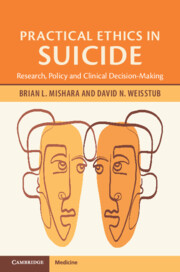Book contents
- Practical Ethics in Suicide
- Practical Ethics in Suicide
- Copyright page
- Contents
- Preface
- Acknowledgements
- 1 Ethical Perspectives to Guide Decision-Making
- 2 Moral Dilemmas in Helpline Rescue Policies
- 3 Ethical Challenges in Suicide Research
- 4 The Control of Suicide Promotion over the Internet
- 5 Genetic Testing for Suicide Risk Assessment
- 6 Suicide and Civil Commitment
- 7 The Legal Status of Suicide
- 8 The Rhetoric of Assisted Suicide and Euthanasia (‘Medical Assistance in Dying’)
- 9 Suicide Prevention and the Expansion of Medical Assistance in Dying
- 10 Conclusion: My Brother’s Keeper
- References
- Index
5 - Genetic Testing for Suicide Risk Assessment
Published online by Cambridge University Press: 15 February 2024
- Practical Ethics in Suicide
- Practical Ethics in Suicide
- Copyright page
- Contents
- Preface
- Acknowledgements
- 1 Ethical Perspectives to Guide Decision-Making
- 2 Moral Dilemmas in Helpline Rescue Policies
- 3 Ethical Challenges in Suicide Research
- 4 The Control of Suicide Promotion over the Internet
- 5 Genetic Testing for Suicide Risk Assessment
- 6 Suicide and Civil Commitment
- 7 The Legal Status of Suicide
- 8 The Rhetoric of Assisted Suicide and Euthanasia (‘Medical Assistance in Dying’)
- 9 Suicide Prevention and the Expansion of Medical Assistance in Dying
- 10 Conclusion: My Brother’s Keeper
- References
- Index
Summary
We explore ethical premises and practical implications of using genetic testing to predict suicide risk. Twin studies indicate heritable components of suicide risk, and associated heritability of mental disorders. Currently, genetics research has abandoned seeking single gene Mendelian determinants, in favour of complex probabilistic epigenetic models. Genome-Wide Association Studies (GWAS) may identify thousands of single nucleotide polymorphisms (SNPs), each contributing very little to the variance in behavioural phenotypes. Since suicide is a behaviour rather than a phenotype, with many different causal aetiologies, it is impossible to predict the behaviours of individuals. We analyse practical and ethical issues that would arise if future research were to identify genetic information that accurately predicts suicide. We examine analytical validity, clinical validity, clinical utility and ethical, legal and social implications. Low sensitivity and specificity for predicting suicide diminish potential advantages and exacerbate risks. We discuss risks of unregulated direct-to-consumer genetic testing services. If someday genetic testing can accurately identify suicide risk in individuals, its use would be contraindicated if we cannot provide effective preventive interventions and mitigate negative impacts of informing people of their suicide risk.
- Type
- Chapter
- Information
- Practical Ethics in SuicideResearch, Policy and Clinical Decision-Making, pp. 82 - 101Publisher: Cambridge University PressPrint publication year: 2024

